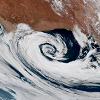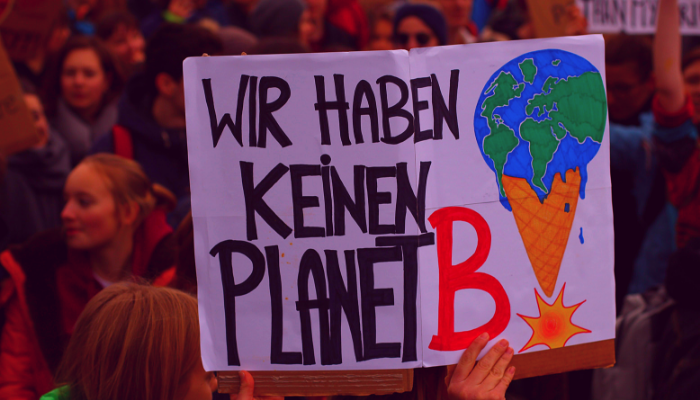AustLit
-
School strike for science on Heldenplatz, Vienna, Australia, 15 March 2019. Wikimedia Commons.
We envision a world where people live without fear of climate-induced catastrophe or nuclear war. The first step to taking meaningful action is to understand these challenges.
Outrider Foundation, 2019.
Here, we collect the voices of the scientists. To discuss climate change is to discuss science, and here we collect some of the work of the scientists who are tracking what is happening, hypothesising what will happen, and analysing how much we can stop happening.
This section takes the form of Organise - Read - Listen - Watch: explore articles, podcasts, and videos from the people who are in the best position to explain the science of climate change.
The keyword for this section is 'knowledge'. In a world where apocalyptic headlines come fast and furious, we seek to know what human-induced climate change means for us and for the world. If climate change fiction is the imagination, this is the knowledge.
-
Monsoonal squall off the coast of the Northern Territory, near Darwin. Wikimedia Commons.
Intergovernmental Panel on Climate Change (IPCC): the United Nations Body for assessing the science related to climate change.
Outrider Foundation: the foundation, based in Wisconsin, believes that the first step to a world without fear of climate-induced catastrophe is understanding. They produce in-depth articles and interactive features, including the following timelines:
'Climate History: The Early Science'.
'Climate History: The World Reacts.'
The Paris Agreement: signed in 2016 and part of the United Nations Framework Convention of Climate Change, the Paris Agreement aims to strengthen the global response to climate catastrophe by limiting global temperature rise.
Seed: Australia's first Indigenous youth climate network, a branch of the Australian Youth Climate Coalition.
Svalbard Global Seed Vault: this global seed vault serves as a back-up storage facility to protect the world's genebanks and ensure the preservation of genetic variety in crop foods.
-
Cyclone Inigo approaching northwest Australia in 2003. Wikimedia Commons.
-
Australian International Food Security Research Centre. 'Food Security and Why It Matters'. (Undated government resource.)
Bradley, James. 'How Australia's Coal Madness Led to Adani'. The Monthly, April 2019.
'The real reasons keeping the Carmichael mine alive.'
Flannery, Tim. 'A Change Is in the Air'. Incite, vol, 36, no. 10, 2015, pp.12-13.
Discusses the accessibility of information about climate change in Australia.
Flannery, Tim. 'People Are Shocked about Climate Change but They Should Be Angry'. The Guardian. 21 March 2019.
'The author and scientist, who has returned to his roots at the Australian Museum, says the world is about to see a major shift towards climate action'.
Gergis, Joelle. 'I’m a Climate Scientist and Writer: This Election is the Most Important in Australia’s History'. The Conversation. 19 May 2022.
Emphasises the vital importance of making significant change within the next few years.
Meyer, Robinson. 'The Cataclysmic Break that (Maybe) Occurred in 1950'. The Atlantic. 17 April 2019.
Contextualises recent scientific debates about the nature of the Anthropocene and when it began.
---. 'The 3 Big Things that People Misunderstand about Climate Change'. The Atlantic. 22 February 2019.
Interview with David Wallace-Wells, author of The Uninhabitable Earth.
---. 'The Very Optimistic New Argument for Dimming the Sky'. The Atlantic. 12 March 2019.
Sets out the arguments in favour of solar geo-engineering.
Ratner, Paul. 'Where Will the "Water Wars" of the Future Be Fought?'. World Economic Forum, 23 October 2018.
Ryan, Benjamin. 'These Days, It's Not About the Polar Bears'. The New York Times, 12 May 2019.
Outlines the history and significance of climate change communication, or how scientists speak to the lay community.
-
The Dimmitt Tornado, Texas, 1995. Photograph by Harold Richter. National Oceanic and Atmospheric Administration (USA).
-
In this audio lecture presented by the State Library of Victoria, Dr Joëlle Gergis talks about her book, Sunburnt Country, and the long-term history of Australian climate variability and extremes.
-
Brian Cox and Robin Ince discuss climate change with Dara O'Briain, Professor Tony Ryan, and Dr Gabrielle Walker.
-
Associate Professor Matt McDonald (School of Political Science and International Studies at The University of Queensland) talks to Alan Hickey about Australia's contribution to global climate change.
-
Tanker Megaborg oil spill, Gulf of Mexico, 8 June 1990. National Oceanic and Atmospheric Administration (USA).
-
The Sydney Opera House presents Tim Flannery on the topic of hope for the planet.
You might be interested in...









